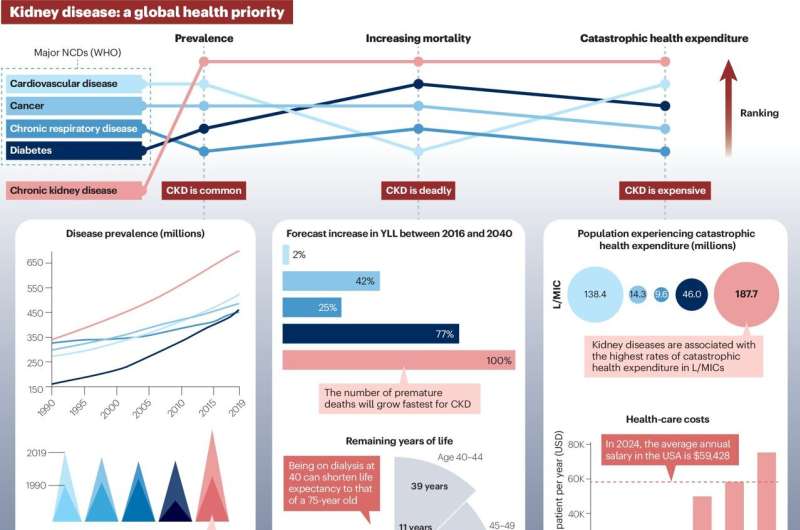This article has been reviewed according to Science X's editorial process and policies. Editors have highlighted the following attributes while ensuring the content's credibility:
fact-checked
trusted source
proofread
Consensus statement calls for urgent action to address chronic kidney disease on the global public health agenda

On April 3, 2024, Nature Reviews Nephrology published an international consensus statement titled "Chronic Kidney Disease and the Global Public Health Agenda: An International Consensus." Authored by a coalition of leading experts, stakeholders, and nephrology societies, the publication highlights critical policy, advocacy, and implementation needs to alleviate the growing burden of kidney disease worldwide.
"In contrast to cardiovascular disease, stroke, and respiratory disease, chronic kidney disease (CKD) mortality rates have been on a troubling rise. Presently, kidney disease stands as the third fastest-growing cause of death worldwide, with deaths attributable to kidney disease surged by 50% from 2000 to 2019," notes Masaomi Nangaku, president of the International Society of Nephrology.
CKD and acute kidney injury (AKI) present significant challenges to global health, particularly in low- and middle-income countries (LMICs) where access to care and preventive services is limited. The World Bank highlights that CKD is responsible for the largest number of people suffering catastrophic health care expenditures annually, particularly in LMICs. More than one million individuals with potentially reversible AKI succumb yearly due to the lack of timely therapies, including dialysis, underscoring the urgency of addressing access gaps in health care services.
Key recommendations from the international consensus include:
- Improved Access to Care: Enhancing the availability of affordable and accessible health care services is paramount to addressing the diagnostic, treatment, and preventive needs of individuals with CKD and AKI, especially in resource-constrained settings.
- Better Prevention Strategies: Effective strategies for preventing CKD and AKI must be developed through multidisciplinary research and community engagement, with a focus on understanding risk factors and tailoring interventions to local contexts.
- Development and Scaling of Care Models: Implementing balanced, scalable, and sustainable models of care requires collaborative efforts with stakeholder communities and innovative approaches such as task-sharing, digital technologies, and online platforms for training and supervision.
- Greater Awareness and Education: Awareness campaigns are essential to educate both individuals and primary care providers about the importance of early diagnosis and management of CKD, thereby reducing its progression and associated complications.
- Addressing Social Determinants of Kidney Health: Recognizing and addressing social determinants of health, such as poverty and lack of access to basic amenities, are crucial steps in mitigating the burden of kidney diseases, particularly among marginalized communities.
- Increased Funding for Research and Development: Adequate funding is needed to support research initiatives aimed at developing new treatments, improving understanding of kidney diseases, and addressing global disparities in health care access and outcomes.
- International Cooperation and Coordination: Collaborative efforts at the international level are vital for promoting effective policies, programs, and knowledge sharing to prevent, detect, and manage kidney diseases worldwide.
- Greater Engagement with Patient Communities: Meaningful involvement of patient communities is essential for designing patient-centric policies, programs, and services that address the diverse needs and priorities of individuals living with kidney diseases.
The consensus statement deplores the underrepresentation of kidney disease in media and public discourse, with an 11-fold disparity between discussed versus actual causes of death.
"This consensus statement marks a significant first step in recognizing the impact kidney diseases have on more than 850,000,000 people globally and the need to eliminate disparities in kidney health and achieve equity in kidney care for people from all walks of life. I believe that the World Health Organization (WHO) and governments worldwide will rise to meet this call to action," declares Deidra Crews, president of the American Society of Nephrology.
The 2015 United Nations Sustainable Development Goal 3.4 aims to reduce premature mortality from NCDs by a third by 2030. To tackle this goal, the WHO has recognized cancer, heart disease, stroke, chronic lung disease and diabetes as the major NCD drivers of early mortality. Failure to include kidney disease in this initiative misses the opportunity to address a major contributor to premature and preventable mortality.
"Kidney disease is under-recognized and under-resourced. Recognizing the silent yet pervasive impact of kidney disease as a leading driver of NCDs, our three societies can mobilize joint efforts to save lives and enhance health outcomes globally. Through collaborative efforts, we can amplify awareness, allocate resources, and prioritize global kidney health in our pursuit of a healthier, more equitable future for all," concludes Christoph Wanner, president of the European Renal Association.
More information: Kidney disease: a global health priority, Nature Reviews Nephrology (2024). DOI: 10.1038/s41581-024-00829-x




















